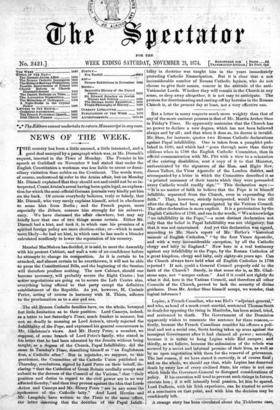The old Roman Catholic families have, on the whole, betrayed
but little hesitation as to their position. Lord Camoys, indeed, in a letter to last Saturday's Times, much franker in manner, but not so deadly in meaning as Lord Acton's, utterly rejected the Infallibility of the Pope, and expressed his general concurrence in Mr. Gladstone's views. And Mr. Henry Petre, a member, we suppose, of some branch of Lord Petre's family, who stated in his letter that he had been educated by the Jesuits without being taught, as a dogma of the Church, Papal Infallibility, did the same in Tuesday's Times, describing himself as "an Englishman first, a Catholic after." But in rejoinder, we suppose, to this gentleman, the Committee of the Catholic Union published on Thursday, resolutions, signed by Lord Petre on their behalf, de- claring " that the Catholics of Great Britain cordially accept and submit to the decrees of the Council of the Vatican," that "their position and duties in regard to the civil power are in no way affected thereby," and then they protest against the idea that Lords Acton and Camoya and Mr. Henry Petre "are in any sense-the ,spokesmen of the Catholic laity." And Lord Herries and Mr. Langdale have written to the Times to the same effect, the latter isserting that the doctrine of the Papal Infalli- bility in doctrine was taught him in the years immediately preceding Catholic Emancipation. But it is clear that a not inconsiderable number of Roman Catholic laymen, who do not choose to give their names, concur in the attitude of the anti- Vaticanist Lords. Whether they will remain in the Church in any sense, or drop away altogether, it is not easy to anticipate. The process for discriminating and casting-off lay heresies in the Roman Church is, at the present day at least, not a very effective one.


































